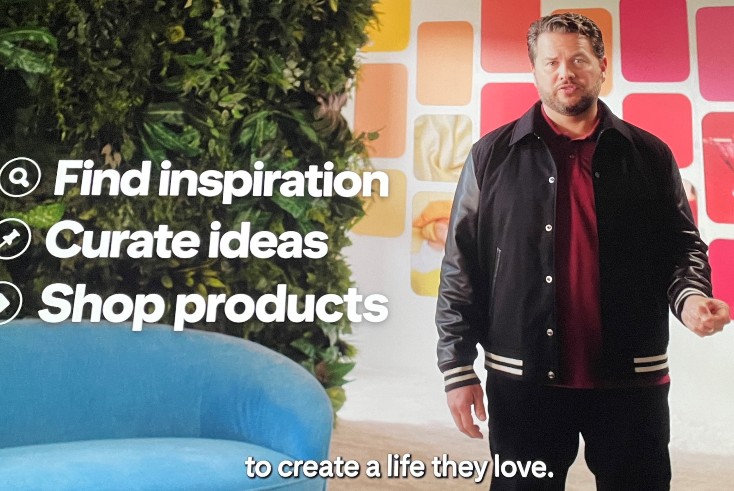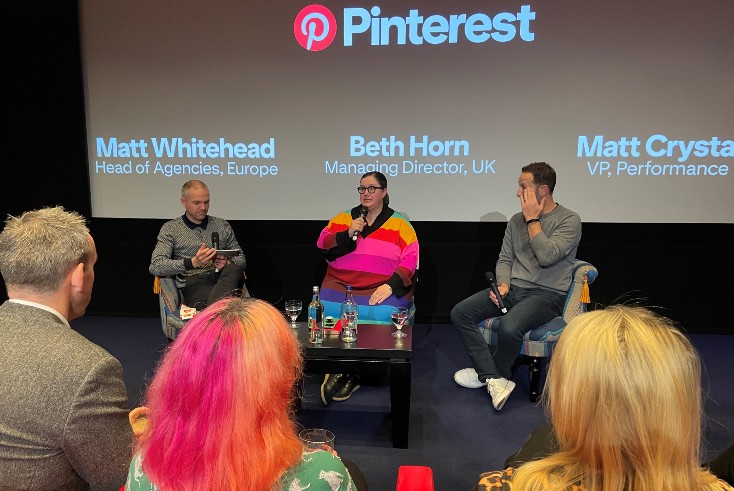Pinterest eyes performance budgets as it takes on Big Tech

“The stores have opened.”
In remarks made at the Pinterest Presents 2024 event, CEO Bill Ready described how Pinterest has significantly improved its performance options for advertisers in pursuit of developing a full-funnel offering.
Ready said the platform is “now winning meaningful performance budgets”, thanks in part to a concerted effort to provide tools to make it easier for brands to spend on Pinterest and measure their return on adspend.
That includes shoppable ad formats, which Ready described as providing both value to consumers and the brands they’re looking to discover on Pinterest.
“When we deliver on relevance, ads are great content,” said Ready. “They’re actually helpful to our users, not distractions.”
He announced that Pinterest has more than doubled clicks out to retailer websites year on year through the shoppable formats, suggesting users are increasingly coming to Pinterest to shop.
Beth Horn, Pinterest’s new UK managing director, added that “the goal is to make everything you see on Pinterest shoppable” and the platform is looking to provide “brandformance” solutions for advertisers depending on their KPIs.
That said, vice-president of performance Matt Crystal, who recently relocated to London to help grow Pinterest’s performance business in the UK, noted that, unlike some of its competitors with true marketplaces, Pinterest does not want to be a platform that hosts transactions.
“We don’t want to be a retailer,” he told a crowd of London-based marketers. “We want to be a retailer’s best partner.”
The goal, according to Crystal, will be to continue to seamlessly connect products shown on Pinterest to brands’ websites or apps to allow for quick purchasing of items.
Pinterest stakes its business on solving mental health crisis
Performance+ AI solution
As part of the presentation, Crystal announced a suite of new AI tools for advertisers, dubbed Performance+. Pinterest began testing AI uses for advertisers earlier in the year.
The new suite is aimed at boosting campaign performance while significantly decreasing the amount of time required to create and activate a campaign.
Crystal said roughly half the inputs are needed for campaign creation using Performance+ compared with a standard campaign, and that campaign performance jumped 10% in terms of cost per acquisition and cost per click.
Additionally, advertisers will now be able to generate AI-created backgrounds for their product images on Pinterest to provide added creative flair on the platform. Crystal sold the feature as “automatically tak[ing] ad images from boring to beautiful”.

Matt Whitehead, Pinterest’s head of agencies, Europe, predicted Performance+ “will be a big part of how we prove value” to advertisers going forward, especially in the UK market, where performance marketing has become increasingly commonplace.
Apart from Performance+, Pinterest sought to promote its Promotions feature, which allows advertisers to highlight time-bound offers on the platform that can be personalised for users based on what they have searched for and pinned.
Pinterest current counts 522m monthly global active users and Ready was keen to promote that more than 40% of users come from the Gen Z demographic. Pinterest has recently made a point to promote the platform as a place for younger people, supporting the message with a global ad campaign earlier this year.
‘Refuge from the toxicity of social media’
While Pinterest sold its new tools as looking to meet business demands from advertisers, the company also sought to portray itself as a better challenger to major tech and social media companies. Multiple executives sought to draw distinctions between Pinterest’s consumer and brand proposition and the likes of Meta and Google, for example.
Horn, who joined Pinterest after 12 years at Meta, referenced this during the event, telling the crowd she believes “there’s a huge appetite for something new and different… I say that after 12 years at Big Blue”.
Crystal added, more bluntly, that Pinterest serves as “a refuge from the toxicity of other social media” — a line that has also become core to the communication strategies of competitors like Snapchat and TikTok.
Ready reiterated Pinterest’s goal of creating a more positive business model for social media. He has previously staked the success of his business on helping solve the mental health crisis associated with social media, telling advertises last year that if Pinterest does not succeed in its pledge to inspire a more positive and inclusive online experience with its design choices, brands should stop advertising with them.
This year, Ready affirmed that Pinterest was “offering a healthier alternative to social media” and said the platform ranks highly in user wellbeing compared with its peers.
Social media companies don’t want to be ‘social media’ any more
Global chief marketing officer Andréa Mallard directly called out Pinterest’s competitors, urging advertisers to consider reapportioning spend away from the likes of Meta and Google, making both a moral and business case for the consideration of “challenger” social platforms like Pinterest.
“It’s bad for everyone that you can still count on a couple fingers where most of the money in this industry goes,” she said, adding that “having to rely on just a few channels for growth is only getting riskier”.
Mallard continued: “I often hear from other marketers that they feel trapped by the duopoly, with signal loss and rising auction costs already looming. Fellow CMOs have said to me, verbatim, ‘We need another option and we’re rooting for you to win.’
“It’s time our industry had a better choice, a better place to spend marketing dollars. Because I believe marketing budgets aren’t just business conversations, they’re values conversations. I’ve got three teenagers at home and watching my own children come of age online is motivation enough to strive for a better way forward.
“We do not need to trade our children’s emotional wellbeing for return on adspend. It’s unconscionable to think anyone would. Younger generations need social media as an industry to change — and it’s the people and companies that fund these companies, advertisers like you, who wield a lot of power.”
Mallard admitted, however, that providing positive spaces online isn’t enough and that Pinterest needs to perform better, too, to win business.
She added: “After years of playing catch-up, we are punching above our weight.”




